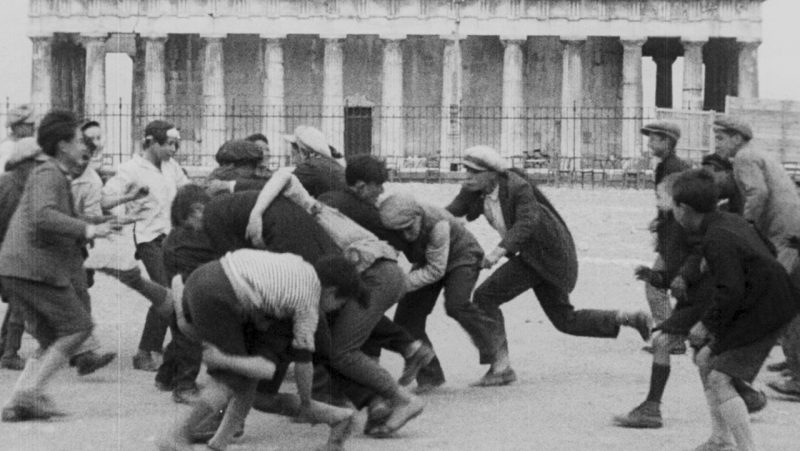MUSICAL ACCOMPANIMENT FOR ORCHESTRA AND CHOIR
Don’t be misled by the title. This is not some Greek-flavoured Western but the first non-conformist Greek film, believed lost for decades. Oi Apachides ton Athinon or The Apaches of Athens by Dimitrios Gaziades, an adaptation for cinema of an operetta by Nikos Hadjiapostolou is on the programme for Wednesday 7 October, starting at 8:30 pm Italian time as a continuing part of the Pordenone Silent Film Festival – Limited Edition. It has recorded music for orchestra and choir and offers remarkable documentation of the working-class neighbourhoods of the Greek capital in 1930. Dissatisfied with the technical shortcomings of the Athens film studios, the director, who reportedly trained in Germany with Lubitsch and Lang, decided to take the camera onto the streets and shot outdoors in ways that were radically different from contemporary tradition. Thus what is striking is not so much the plot, for all its enjoyable qualities (a likeable swindler nicknamed “the prince” tries to con a pompous Greek-American tycoon), but the portrait of poverty and wretchedness of large sections of the population during one of Greece’s not so rare moments of political and social upheaval.
The term “apache” was coined by the French press around the turn of the twentieth century to define the youth gangs who were terrorising Paris with robberies and murders and who stood out for their distinctive clothing.
This print was found four years ago at the Cinémathèque française in Paris, and the restoration project, begun under the patronage of Costa Gavras, was made possible thanks to the collaboration between the French and Greek (Tainiothiki tis Ellados) cinematheques and L’Immagine Ritrovata in Bologna.
As The Apaches of Athens was the first Greek film with synchronized music and songs, it’s important to note that the soundtrack that Yoannis Tselikas of the Hellenic Music Centre of Athens reconstructed was based on the score of the operetta, to which he has added three new songs. The world premiere of the restored film took place to great acclaim at the Stavros Niarchos Hall of the Athens National Opera on February 15th, 2020.
After the film, festival director Jay Weissberg will be joined in a discussion by Maria Komninos, Director of the Greek Film Archive, Yoannis Tselikas of the Hellenic Music Centre, and Céline Ruivo, who was in charge of the print’s restoration.
Our online appointment at the festival begins in the afternoon, Italian time, with a Masterclass on musical accompaniment of silent film (4 pm) followed by book presentations (5 pm). The British composer Neil Brand, who originally conceived the Pordenone Masterclasses together with David Robinson, is at the piano today. His passion, authority and storytelling talents can draw any kind of audience into music and silent film. Used to standing ovations, Neil has composed the score for our closing programme, “Laurel or Hardy”.
Today’s book presentation is an entirely Italian event, dedicated to the 70th anniversary of the Cineteca Nazionale in Rome, with the publication of Alfredo Baldi’s 70 anni della Cineteca Nazionale del Centro Sperimentale di Cinematografia, 1949-2019, and a study of the relations between fashion and film – with a special focus on the silent era – in Eugenia Paulicelli’s volume Moda e Cinema in Italia. Dal Muto ai giorni nostri.
The Pordenone Silent Film Festival takes place thanks to the support of the Regione Autonoma Friuli Venezia Giulia, the Ministero per i Beni e le Attività Culturali – Direzione Generale per il Cinema, the City di Pordenone, the Pordenone-Udine Chamber of


 Italiano
Italiano
Recent Comments